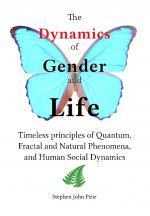Ecological Citizenship
[Reprinted with permission, 28 April, 2011]
From: “ECOLOGICAL PIONEERS: A SOCIAL HISTORY OF AUSTRALIAN ECOLOGICAL THOUGHT AND ACTION” (by Martin Mulligan & Stuart B. Hill, 2001, Cambridge University Press, Melbourne, VIC); pp. 304-5.
 "The Dynamics of Gender and Life" ebook is now available at
"The Dynamics of Gender and Life" ebook is now available at